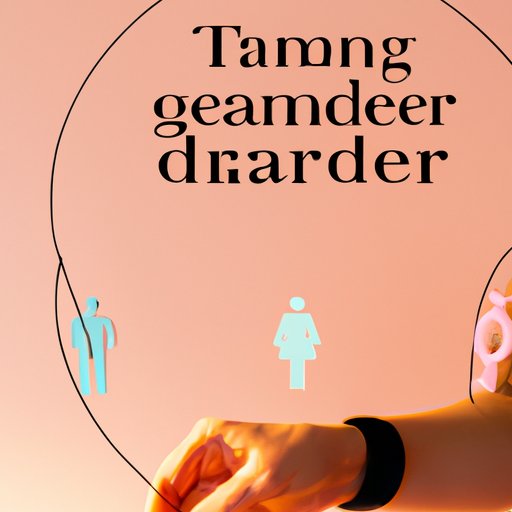
Is Transgender a Mental Disorder?
As society continues to become more accepting of the diverse beliefs, orientations, and lifestyles of individuals, the conversation surrounding transgender identity has become more relevant. Among the topics being discussed is whether or not transgender is a mental disorder. The stigma and discrimination that transgender individuals face are often compounded by the notion that their gender identity is a result of a mental disorder. This article aims to explore whether transgender identity is a mental disorder and the impact of this misconception on the transgender community.
Setting the Record Straight: Debunking the Myth that Transgender is a Mental Disorder
The transgender identity has been traditionally categorized as a mental disorder, listed under the former diagnosis of Gender Identity Disorder or Gender Dysphoria in the Diagnostic and Statistical Manual of Mental Disorders (DSM). The evolution of how gender identity was labeled as a mental disorder reflects the societal misconceptions about transgender individuals. Medical professionals have become more aware of the harm that this classification could cause and have worked on updating the DSM’s diagnosis.
It’s essential to differentiate between gender identity and mental illness. Gender identity is an individual’s internal sense of their own gender, while mental illness refers to a wide range of mental health disorders unrelated to gender identity. Placing gender identity under the umbrella of mental illness perpetuates stigmatization of transgender individuals and disregards the differences between mental illnesses and gender identity.
Beyond the Label: Exploring the Complexities of Transgender Identity
Gender identity is a multifaceted concept that goes beyond the traditional conceptions of male and female identities. People who do not identify within the gender binary system experience gender identity in a way that is different from society’s expectations. The transgender community encompasses various gender identities, including non-binary, genderqueer, and gender non-conforming individuals. It’s important to acknowledge the complexity of gender identity in the transgender community to understand better the effect of labeling them as mentally ill and combat prejudice and discrimination.
Gender identity is not a choice but is rooted in a variety of factors, such as neurological, genetic, and environmental influences. Current research shows that the structure and function of the brain and hormone levels can determine one’s gender identity. While we have much to learn about gender identity, it’s important to note that the evidence shows that it’s not a mental disorder or illness.
The Harmful Effects of Labeling Transgender as Mentally Ill
The labeling of transgender as mentally ill has detrimental effects on the mental health and well-being of transgender individuals. Transgender individuals face high levels of discrimination, harassment, and violence, which leads to anxiety, depression, and trauma. The stigma of being mentally ill could lead to further invalidation and marginalization of their gender identity. It is crucial to recognize the harmful effects of labeling transgender as mentally ill.
Stigma and discrimination can impact transgender individuals differently, depending on the person’s race, class, sex, and geographic location. Neglecting to acknowledge that gender identity is not a mental illness contributes to this intersectional oppression. Research shows that transgender individuals who face less discrimination have better mental health outcomes.
The Science Behind Gender Identity: Why Transgender is Not a Mental Disorder
The science surrounding gender identity shows that it is not a mental disorder, and various studies back this claim. The brain operates differently regarding gender identity than it does for sexual orientation. While more research is needed to fully understand gender identity, we can draw conclusions that it’s not a mental disorder as it does not fit the current definition of a mental illness.
Biological factors, including hormone levels, have an impact on gender identity. Fetal development shapes sex hormones, influencing the formation of the brain in crucial ways that can influence a person’s gender identity. Evidence in the field suggests that hormone levels have a more significant impact on gender identity than previously thought.
The Stigma of Mental Illness and Its Impact on the Transgender Community
The transgender community faces a lot of stigma around mental health because of the above-mentioned myth. Mental health professionals attest that there is a significant negative impact when we associate gender identity with being mentally ill. It delays and deters transgender individuals from seeking out the care they need, decreasing their overall health outcomes.
Individuals who belong to marginalized groups are less likely to access mental health services. Transgender individuals have to deal with transphobia, homophobia, and racism in medical settings. It’s crucial for mental health professionals to work towards not stigmatizing transgender individuals for seeking mental health treatment and increasing access to care. Social support systems, including family, friends, and the LGBTQ+ community, can positively impact mental health outcomes. We must create an inclusive environment for transgender individuals to thrive and live healthy lives.
Conclusion
Transgender is not a mental disorder, and it’s time to stop perpetuating this harmful myth. While we have made progress in recognizing the harmful effects of labeling transgender as mentally ill, there’s still much work to do. Recognizing the complexity of gender identity beyond the male/female binary system and acknowledging the diverse identities present in the transgender community is a critical step in creating a world where everyone feels validated. Mental health professionals must work together to ensure that transgender individuals do not experience further marginalization due to the stigma surrounding mental illness. Together, we can work towards creating inclusive and nurturing environments for everyone to thrive.





